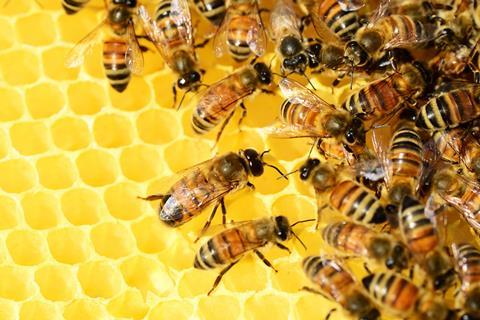The world’s first vaccine for honey bees has been approved by authorities in the US.
The product was engineered by biotech firm Dalan Animal Health to prevent fatalities from American foulbrood disease, a bacterial condition that weakens colonies by attacking bee larvae.
The US Department of Agriculture (USDA) approved a conditional approval for the vaccine this week.

Dalan Animal Health says there had previously been no safe and sustainable solution for prevention of American Foulbrood. Overt clinical cases of American Foulbrood are notifiable in the USA and Canada, and the only treatment method relies on the incineration of bees and infected hives and equipment.
The vaccine, which contains killed whole-cell Paenibacillus larvae bacteria, is administered by mixing it into queen feed which is consumed by worker bees.
How it works
The vaccine is incorporated into the royal jelly by the worker bees, who then feed it to the queen. She ingests it, and fragments of the vaccine are deposited in her ovaries. Having been exposed to the vaccine, the developing larvae have immunity as they hatch.
Pivotal efficacy studies have indicated that oral vaccination of honeybees may reduce larval death associated with American Foulbrood infections caused by P. larvae. The vaccine is non-GMO and can be used in organic agriculture.
The USDA says many, sometimes overlapping, factors threaten honey bee health, including parasites, pests and disease, as well as a phenomenon called Colony Collapse Disorder, which occurs when worker bees abandon a hive and leave behind the queen.
Pollinators such as bees, birds and bats are responsible for about a third of the world’s crop production, according to the United Nation’s Food and Agricultural Organization.
Breakthrough
The new Paenibacillus Larvae Bacterin vaccine could serve as a “breakthrough in protecting honey bees”, Dalan Animal Health CEO Annette Kleiser said in a statement.
“We are committed to providing innovative solutions to protect our pollinators and promote sustainable agriculture. Global population growth and changing climates will increase the importance of honeybee pollination to secure our food supply. Our vaccine is a breakthrough in protecting honeybees. We are ready to change how we care for insects, impacting food production on a global scale,” she said.
Trevor Tauzer, owner of Tauzer Apiaries and board member of the California State Beekeepers Association, said: ”This is an exciting step forward for beekeepers, as we rely on antibiotic treatment that has limited effectiveness and requires lots of time and energy to apply to our hives.
“If we can prevent an infection in our hives, we can avoid costly treatments and focus our energy on other important elements of keeping our bees healthy.”
The bacterin was developed by Dalan Animal Health, and is manufactured by Diamond Animal Health (Des Moines, IA), a wholly-owned subsidiary of Heska (“Heska”; NASDAQ: HSKA).
“We are grateful for the help and assistance that Diamond has been able to offer – not just in manufacturing development, but also regulatory expertise,” said Kleiser.
The USDA has issued the conditional license in the first instance for two years. Dalan will distribute the vaccine on a limited basis to commercial beekeepers and anticipates having the vaccine available for purchase in the United States in 2023.







No comments yet